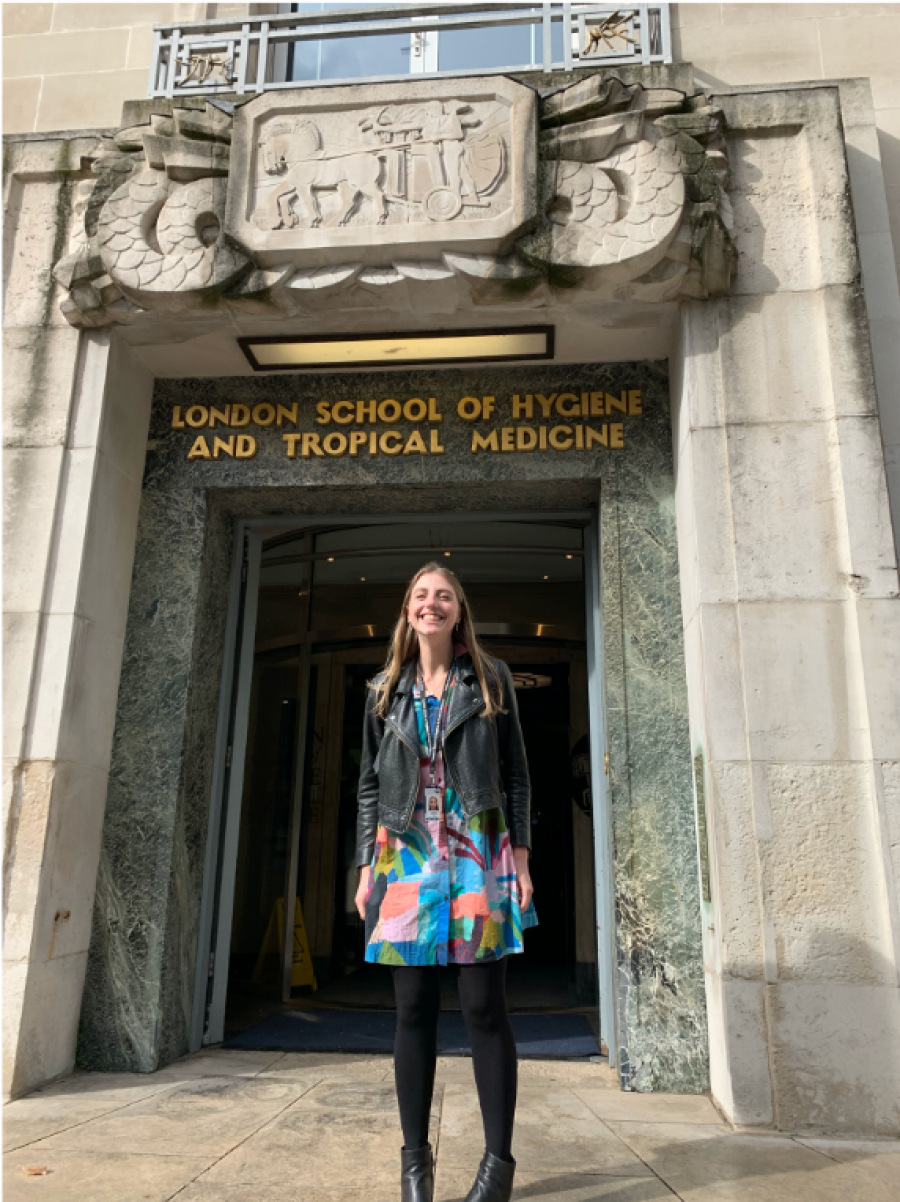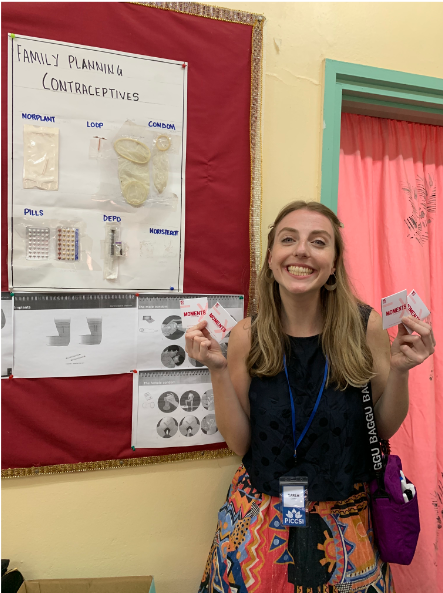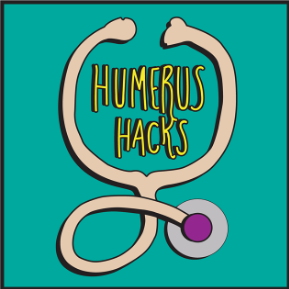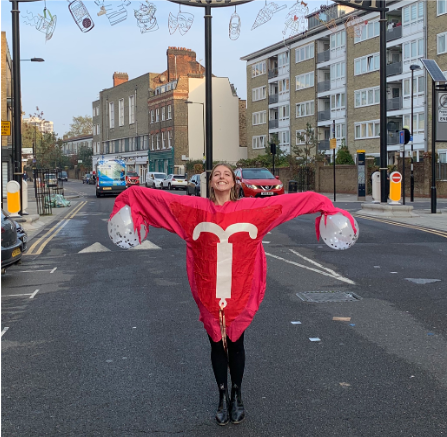Karen runs a successful medical education podcast named “Humerus Hacks” on Spotify. In this interview she takes us on a fascinating journey through her past work and how she arrived at LSHTM, and what she plans to do in her career after leaving LSHTM. She also talks to us about being in medical school and gives advice to anyone considering a career as a medic.

Why and how did you choose to do this master’s at LSHTM?
I’ve always wanted to specialise in sexual health and I was also very interested in public health and research, and also a lot of more ‘arts’ subjects that I never got to explore during medical school – as it was quite busy!
Through the grapevine I heard about LSHTM, and people would come back to Australia after doing their master’s at the school would tell me how amazing the experience is. Someone mentioned the sexual and reproductive health course, and everything just came together nicely. I really wanted to do a master’s in public health, take a year off from working clinically to study, do something different, and also I really wanted to live overseas for a year – and I think there’s a phase, “every Australian must live in London at least once in their lifetime”.
So I did.
I heard from people from Australia who did this same course and absolutely raved about it – and they were right, it’s absolutely fantastic so far.
What were you doing before you arrived at the school?
I love being a clinician and working with patients. I especially like working with young people. I’ve worked for just over 3 years, and it’s actually been quite weird not working this year. I’m now more enthusiastic about going back and making sure that my work is coupled with research, advocacy or health promotion – using clinical work together with research and having a dual focus.
We know how hectic it can get with clinical work, and a lot of people worry that they won’t have the time with their busy schedules to do research or public health work, how do you see yourself facing this challenge?
This is the million-dollar question! And It’s something that will be definitely challenging. I have a few more years of formal training to specialise in sexual health, fortunately research is very emphasised and important in Australia, so I will have to do research as part of my work. Once my training is completed, I’m hoping I will have more flexibility to do other things and open new doorways, especially in sexual health promotion.
Tell us about an area you are very passionate about and how have you tried to improve it?
I am very passionate about education overall, for both medical and health students as well as the wider public. I am currently involved in two projects at the moment!
I host a medical education podcast called Humerus Hacks, it’s now in its fifth year! Each episode is teaching a health topic in an interesting way and using mnemonics, engaging techniques, and it’s meant to be quite funny I hope – hence the name. It’s one of the top medical education podcasts in Australia, and I really love doing it. We get really good feedback, and I’m keen to continue doing it.
I also create and write workshops for an organization called Elephant Ed, based in Australia, which runs sex ed to high schools. I put together the workshops and I also have a medical advisory role. I love teaching sex education in its multiple forms and I’m exciting to bring my experience at LSHTM back and continue this work.
The podcast sounds really interesting – how did that come about?
We got the idea when I was still in medical school. Being at LSHTM, I think their education is very engaging, and I wish medical education was more like it. But my friend and I would find our lectures in Australia to be very heavy and dull. Our lectures often had a lot of information in them and were quite overwhelming, also they were aimed at physician level, and were not aimed at medical students who literally didn’t know where the Adrenal glands were!
So me and Sarah, who I run it with, would run tutorials every Sunday for the year below us at medical school. We would use mnemonics and funny ways to remember things, and they worked - students found it easier to remember these complicated medical concepts.
At the same time I was travelling about two hours a day to and from my placement, and Sarah had an injury and was struggling to sit down, so we both were struggling to settle and study. We started looking for medical education podcasts as we thought it could be a good way to revise. But there was really nothing out there back in 2015/16. The ones we found we thought were dry and dull.
And the thought came - if we could run funny educational workshops in classes, why not put them in podcast form?
We did a little jingle, made a nice logo, and we recorded the first episode in garageband. It got thousands of hits really quickly – and we were thrilled.
So we started doing more, and now we’re on our 43rd episode at the moment. We’ve presented in around Australia, Stanford University in the US, and ASME Conference of medical education in the UK. We’ve now had six figures of downloads – it’s been very exciting for us!
Podcasts are a very good way to pass time when you’re on the bus or walking home, and it’s great that there are such innovative podcasts out there like Humerous Hacks. On another topic, how do you think being at the school now is going to reflect on your future work?
It’s 100% opening up my eyes on what’s out there and what people are doing. I came in already have been working as a doctor on contraception, STIs, and abortion and so on. And coming here every single day I’m learning so much that my mind is like that “exploding brain emoji”.
I think its brilliant being around these world-famous experts and innovative ideas, and the amazing quantitative and qualitative projects going on in the school. What I really loved was the lunch hour seminars and the global health series lectures, it’s has been really motivating. It makes me feel sad to be leaving at some point, but also glad to have ties with the school, and to bring some of it back to Australia.
In terms of career, there are a lot of people in the school are planning to start medical school after their masters, having done you’re medical training, what do you think they should consider when making this decision?
I would say that medical school is a big commitment. It’s a love/hate relationship. Being a doctor is a fantastic and a terrible decision at the same time.
I absolutely love it, but one thing to consider is where you see yourself 20 years from now. A lot of people don’t realise that it can take a very long time to become a specialist. I started medical school in 2010 and I’ve still got 5 years left. So if you’re sure that you want to do clinical work, then it’s terrific, but I would also encourage people to consider nursing, midwifery or even being a researcher instead.
If you’re doing medical school to do research, I’d say that there are so many ways to do health research without medical school and it’s worth looking into that instead. And there’s so many excellent allied health jobs!
In saying that, I have to stress that I love medical school and I wouldn’t change anything about at all, and I am more than happy to chat to everyone about it if they are considering it.
Being here at the school is a great networking opportunity. There are a lot of people here who share the same interests. Do you see any possibilities of working with professionals from the school in the future?
I would love the opportunity to work with people from the school in the future!
Many people told me that half of the reason for coming here is the course itself and the other half is the people that you meet. Sitting here with you for example Sahar, you are amazing, what you do is amazing – as is our entire MSc Reproductive and Sexual Health Research course. The 30 of us are a fantastic bunch!
Let alone the wider master’s cohort in the whole of the school! The networks that we’re making and the kind of cross cultural, cross national communication and collaboration and the contrasting and comparing has been so important and so eye opening and I’m really fortunate to have it.
I really hope that we all collaborate and continue to network and stay in touch in the future because I think the networks that we have created are as important, if not more important, than the course itself.
Thank you so much Karen for being on this interview. Do you have any last remarks or anything that you would like to share or say to the students?
I think a big part for anyone being involved in health and public health is a lot about seeing what opportunities are out there and seeing what already exists and seeing what doors are open.
In August last year (2019) I was fortunate to be part of the PICCSI program (Pacific Island Cervical Cancer Screening Initiative), which is a group of Australian doctors, midwives and nurses who go to the Pacific Islands. Last year we went to Fiji and provided cervical screening to the women there. If a test was positive, we could offer same day colposcopies and treatment.
It was an incredible experience and it was part of a big research project , my role was in it was doing the smears but also providing the sex education and education about STIs and about contraception. What I’d say is keep an eye out for opportunities, because there are so many people doing incredible and important things around the world.
Karen was interviewed by Sahar Ahmed, MARCH B-theme liaison who's currently studying a master’s in reproductive and sexual health research having recently graduated from medical school in Sudan.
Our postgraduate taught courses provide health practitioners, clinicians, policy-makers, scientists and recent graduates with a world-class qualification in public and global health.
If you are coming to LSHTM to study a distance learning programme (PG Cert, PG Dip, MSc or individual modules) starting in 2024, you may be eligible for a 5% discount on your tuition fees.
These fee reduction schemes are available for a limited time only.



